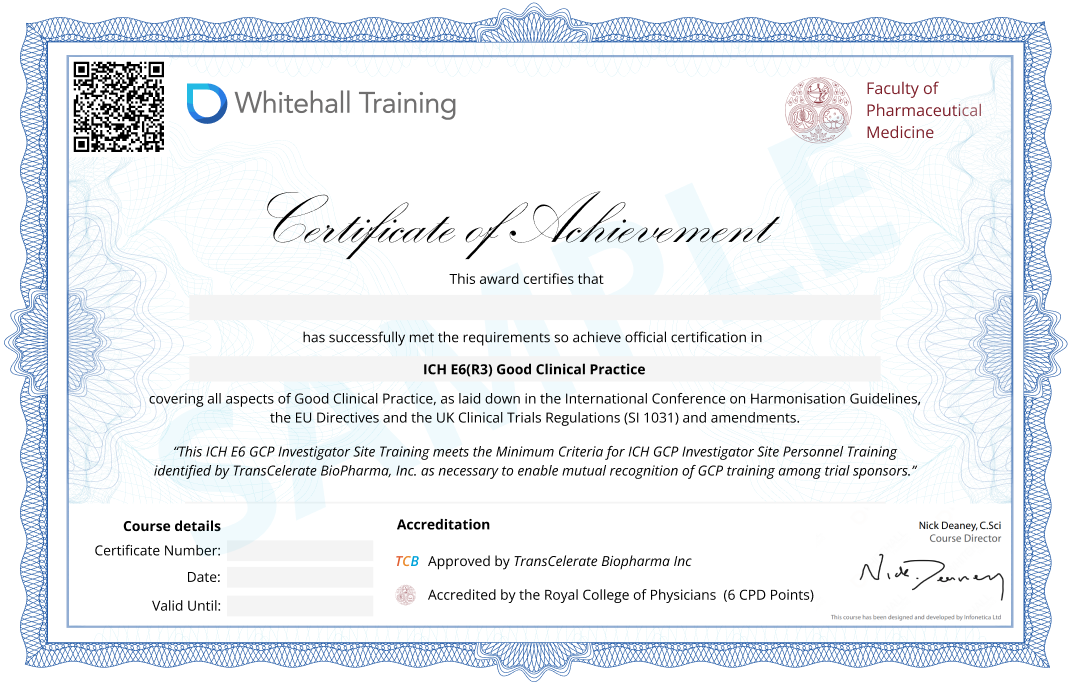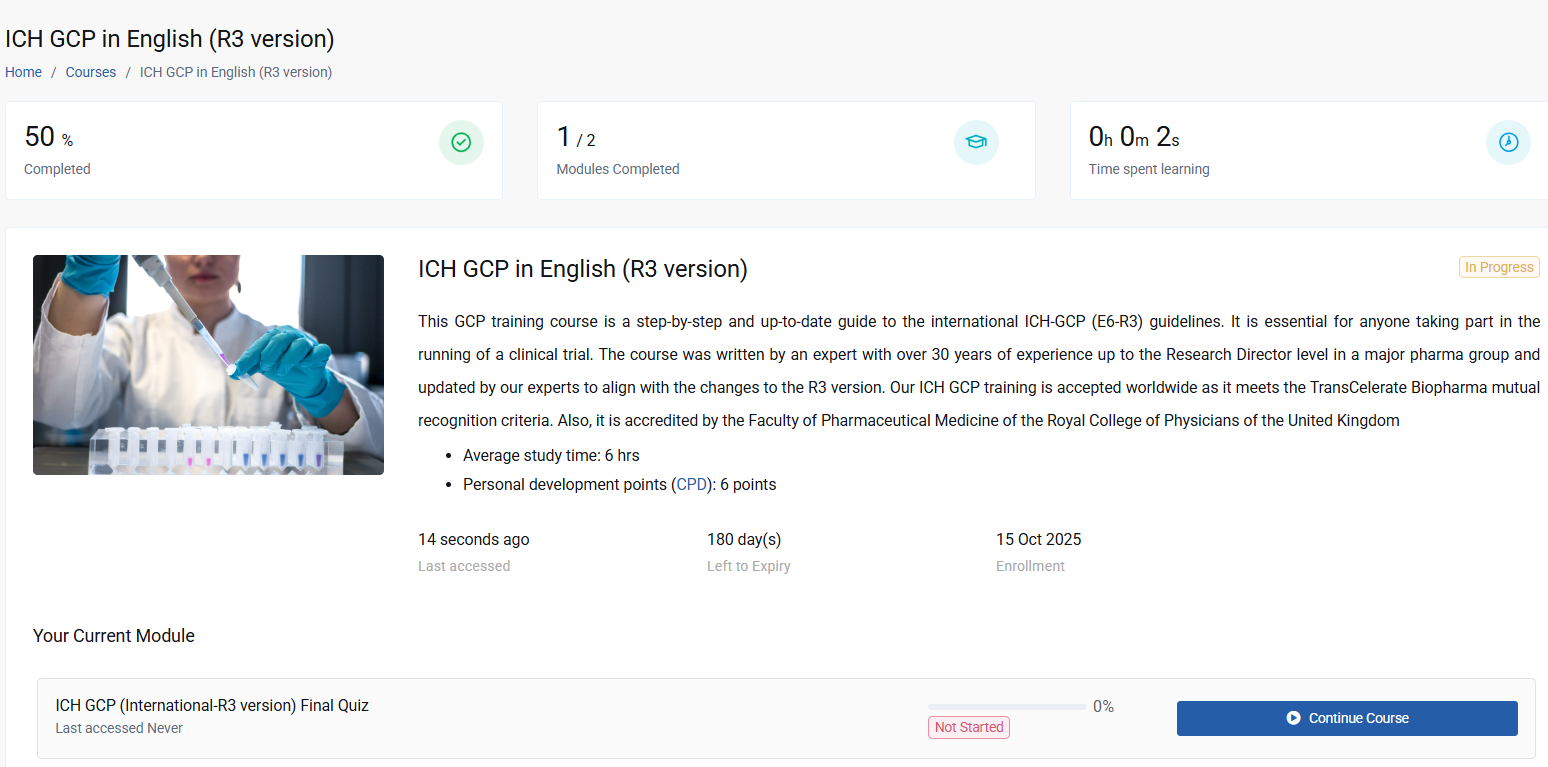I have finalised the demo for the ICH-GCP E6 R3 refresher course. Overall, I liked the content and the interface. I also want to thank Whitehall Train...
About
Ten kurs szkoleniowy GCP został opracowany przez eksperta z ponad 30-letnim doświadczeniem, sięgającym stanowiska dyrektora ds. badań w dużej grupie farmaceutycznej. Obejmuje on międzynarodowe wytyczne ICH-GCP (E6-R3) i spełnia wymogi szkoleniowe dotyczące udziału w międzynarodowych badaniach klinicznych.
Course Syllabus
- Historia GCP: Część 1
- Historia GCP: Część 2
- Historia GCP: Część 3
- Historia GCP: Część 4
- Czym jest GCP?
- Zasady ICH GCP: Część 1
- Zasady ICH GCP: Część 2
- Dodatkowe punkty edukacyjne
- Dokumentacja i kontrola wersji
- Zapewnienie jakości (QA)
- Kluczowe zasoby: Część 1
- Kluczowe zasoby: Część 2
- Wprowadzenie: Część 1
- Wprowadzenie: Część 2
- Wprowadzenie: Część 3
- Wprowadzenie: Część 4
- Wprowadzenie: Część 5
- Wprowadzenie: Część 6
- Wprowadzenie: Część 7
- Wprowadzenie: Część 8
- Wprowadzenie: Część 9
- Obowiązki Organu Regulacyjnego
- Obowiązki IEC
- Formularze Świadomej Zgody Uczestnika Badania (ICF) Część 1
- Formularze Świadomej Zgody Uczestnika Badania (ICF): Część 2
- Skład, Funkcje, Działania, Procedury i Dokumentacja
- Interakcje IEC ze Sponsorami i Badaczami
- Wstęp
- Obowiązki śledczego
- Kwalifikacje i umowy badacza
- Wystarczające zasoby
- Opieka medyczna nad uczestnikami badań: część 1
- Opieka medyczna nad uczestnikami badań: część 2
- Komunikacja z IRB/IEC
- Zgodność z protokołem
- Produkty lecznicze badane
- Procedury randomizacji i odślepiania
- Zgoda świadoma: Wprowadzenie
- Zgoda świadoma: dyskusja na temat zgody
- Świadoma zgoda: osoby, które nie potrafią czytać ani pisać
- Świadoma zgoda: osoby niepełnoletnie i osoby „niezdolne umysłowo
- Zgoda świadoma: osoby niezdolne do wyrażenia zgody
- Świadoma zgoda: Aktualizacja zgody
- Zapisy i raporty: Wprowadzenie
- Zapisy i raporty: Akta miejsca badań
- Zapisy i raporty: Aktualizacje i poprawki
- Zapisy i raporty: dokumenty źródłowe
- Rejestry i raporty: Informacje finansowe
- Akta i raporty: Formularz akt sprawy
- Rejestry i raporty: rejestrowanie danych podmiotu
- Przedwczesne zakończenie lub zawieszenie procesu
- Raporty postępów i raporty końcowe według badacza
- Obowiązki śledczego
- Wprowadzenie: Część 1
- Wprowadzenie: Część 2
- Wprowadzenie: Część 3
- Zarządzanie jakością: część 1
- Zarządzanie jakością: część 2
- Zarządzanie jakością część 3
- QA i QC (zapewnienie jakości i kontrola jakości): Wprowadzenie
- QA i QC (zapewnienie jakości i kontrola jakości): standardowe procedury operacyjne
- QA i QC (zapewnienie jakości i kontrola jakości): umowy i kontrakty
- Organizacje badawcze kontraktowe
- Projekt próbny
- Zarządzanie badaniami: Wprowadzenie
- Zarządzanie badaniami: zarządzanie danymi
- Zarządzanie badaniami: dane elektroniczne
- Zarządzanie badaniami: prowadzenie dokumentacji
- Wybór badacza: Wprowadzenie
- Wybór badacza: uprawnienia
- Wybór badacza: obowiązki
- Wybór badacza: wynagrodzenie
- Finansowanie
- Powiadomienie/złożenie do organów regulacyjnych
- Potwierdzenie przeglądu przez IRB/IEC
- Informacje o IMP
- Produkcja, pakowanie, etykietowanie i kodowanie produktów badawczych: część 1
- Produkcja, pakowanie, etykietowanie i kodowanie produktów badawczych: część 2
- Dostarczanie i obsługa produktów badawczych
- Dostęp do rekordów
- Przetwarzanie danych I
- Przetwarzanie danych II
- Przetwarzanie danych III
- Przetwarzanie danych IV
- Obsługa danych V
- Przetwarzanie danych VI
- Programowanie statystyczne i analiza danych I
- Programowanie statystyczne i analiza danych II
- Przechowywanie i przechowywanie dokumentacji
- Audyt i inspekcja
- Niezgodność
- Przedwczesne zakończenie lub zawieszenie procesu: część 1
- Przedwczesne zakończenie lub zawieszenie rozprawy: część 2
- Raporty z badań klinicznych/badań
- Badania wieloośrodkowe
- Wstęp
- Zarządzanie danymi – część 1
- Zarządzanie danymi – część 2
- Utrzymuj ślepą ślepotę
- Cykl życia danych I
- Cykl życia danych II
- Cykl życia danych III
- Cykl życia danych IV
- Systemy komputerowe I
- Systemy komputerowe II
- Systemy komputerowe III
- Systemy komputerowe IV
- Systemy komputerowe V
- Systemy komputerowe VI
- Systemy komputerowe VII
- Wprowadzenie
- Monitor
- Wizyta monitorująca: Część 1
- Wizyta monitorująca: Część 2
- Weryfikacja IMP
- Zgodność z protokołem, poprawkami, procedurami operacyjnymi i wytycznymi
- Weryfikacja świadomej zgody
- Formularz dokumentacji przypadku (CRF) i dokumenty źródłowe
- Weryfikacja danych podmiotu
- Zakończenie wizyty monitorującej
- Raport i plan monitorowania
- Zarządzanie jakością – scentralizowany monitoring
- Oszustwa i nadużycia: Część 1
- Oszustwa i nadużycia: Część 2
- Wstęp
- Działania niepożądane, działania niepożądane i podejrzewane niespodziewane działania niepożądane
- Poważne zdarzenia niepożądane
- Susary
- Niepożądane zdarzenia o szczególnym znaczeniu
- Okresowe raporty bezpieczeństwa
- Wstęp
- Struktura i zawartość protokołu: część 1
- Struktura i zawartość protokołu: część 2
- Struktura i zawartość protokołu: część 3
- Wstęp
- Struktura i zawartość broszury dla badacza
- Wprowadzenie
- Archiwizacja
- Dokumenty, które należy przedstawić przed badaniem
- Dokumenty, które należy przedstawić po zakończeniu badania
- Glossary & Abbreviations
- EU Guidance Documents
- ICH Guidance Documents
- US FDA Guidance Documents
- GCP Course Printouts
- Global Competent Authorities List
Our Certified Customers
Learner Rating & Reviews
Frequently Asked Questions
Good Clinical Practice (GCP) training is an essential educational program that equips researchers and clinical trial professionals with the knowledge of ethical and scientific standards crucial for conducting high-quality clinical trials. This comprehensive training covers the internationally recognized guidelines established by the International Council for Harmonisation (ICH).
The primary goals of GCP training are:
- Ensuring the protection of human subjects' rights, safety, and well-being
- Maintaining the integrity and reliability of clinical trial data
- Promoting consistent, high-quality practices across all aspects of clinical research
Our GCP course delves into these critical areas, providing learners with a solid foundation in the principles and practical applications of Good Clinical Practice.
For researchers interested in participating in clinical trials, GCP certification is a necessity.
For those who are simply interested in improving their understanding of the field, GCP certification is highly valuable due to its:
- Ensures compliance with international standards
- Enhances research credibility and quality
- Protects participant rights and safety
- Improves career prospects in clinical research
Our course not only provides certification but also equips you with practical skills to apply GCP principles effectively in your work.
GCP certification is essential for a wide range of professionals in clinical research:
- Clinical Trial Investigators: Principal investigators and sub-investigators responsible for trial conduct at research sites.
- Clinical Trial Staff: Including research coordinators, study nurses, and other site personnel involved in trial management.
- Sponsors and Contract Research Organizations (CROs): Those overseeing trial planning, initiation, and reporting.
- Regulatory Authorities: Officials who monitor and evaluate trial compliance.
- Institutional Review Boards (IRBs) and Ethics Committees: Members reviewing and approving trial protocols.
- Academic and Research Institution Staff: Ensuring adherence to international standards in institutional research.
- NIH-Funded Researchers: All investigators and staff involved in NIH-funded clinical trials.
Our course caters to this diverse audience, providing role-specific insights alongside core GCP principles. The course is also valuable for anyone looking to upskill their research abilities and improve their clinical trials operations.
This GCP training course covers the ICH-GCP (E6-R3) international guidelines and meets the training requirement for you to participate in international clinical trials. Multiple language versions are available. This GCP training course is a step-by-step and up-to-date guide to the international ICH-GCP (E6-R3) guidelines. It is essential for anyone taking part in the running of a clinical trial.
The course was written by an expert with over 30 years of experience up to the Research Director level in a major pharma group. Our ICH GCP training is accepted worldwide as it meets the TransCelerate Biopharma mutual recognition criteria. Also, it is accredited by the Faculty of Pharmaceutical Medicine of the Royal College of Physicians of the United Kingdom. Apart from English, the course is available in German, Bulgarian, French, Italian, Japanese, Polish, Portuguese, Russian and Spanish. We also produce regional versions of this course tailored to the specific regulatory frameworks in Australia, the UK, the US, France, Germany and Latin America.
This course features a clear and visually appealing format, allowing for easy cross-referencing to the ICH-GCP E6 document. It offers valuable insights into the practical application of Good Clinical Practice (GCP) based on the author's extensive experience. Furthermore, it is accredited by the Faculty of Pharmaceutical Medicine of the Royal College of Physicians of the United Kingdom and provides participants with the opportunity to earn 6 CPD points.
Yes, our GCP course is accredited by two industry-leading organisations:
- TransCelerate Biopharma Inc.: A nonprofit organisation collaborating with 20 major pharmaceutical companies. Their mutual recognition program is considered the gold standard in the field of clinical practice.
- The Faculty of Pharmaceutical Medicine at the Royal College of Physicians: The professional membership body for pharmaceutical physicians in the UK, known for setting rigorous standards for research since 1989.
These accreditations ensure our course meets the highest industry and academic standards, offering you a widely recognized certification.
Costs vary depending on the following factors:
- Accreditation: Is the course approved by official organisations, like TransCelerate?)
- Certification: Does the course meet the ICH requirements that allows researchers to participate in international clinical trials?
- Quality of content: Is the course up-to-date, and written by an expert?
- Access: How long are learners able to access the course?
Whitehall Training’s GCP course is £79 due to its:
- Accreditation: It is TransCelerate approved, and accredited by the Royal College of Physicians with 6 CPD points.
- Certification: The course enables users to participate in clinical trials, following the ICH E6(R3) guidelines.
- Quality of content: Our course is written by our Good Clinical Practice expert, Lucy Parker, who has over a decade of experience directing research across large research institutes such as the NHS.
- Access: To support the lifelong learning of our researchers, we provide lifetime access to our course resources.
Buying for a team? We offer 10% off orders of 5 licences at checkout. For discounts on larger orders, please get in touch with our team.




